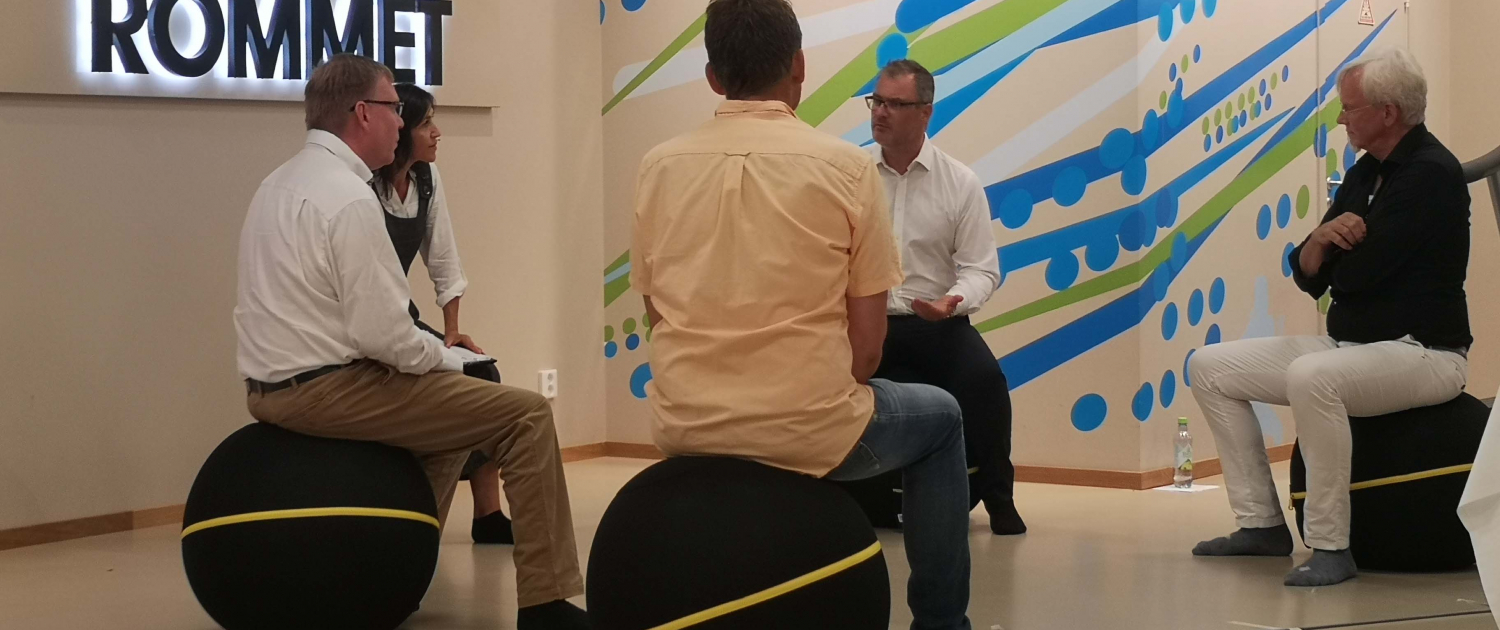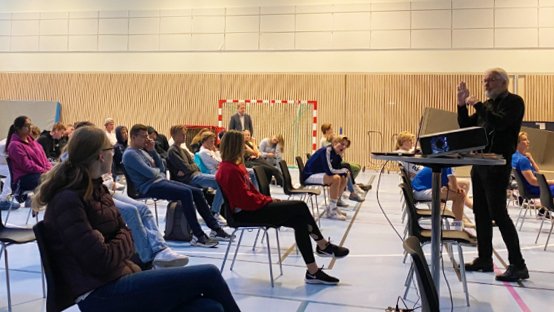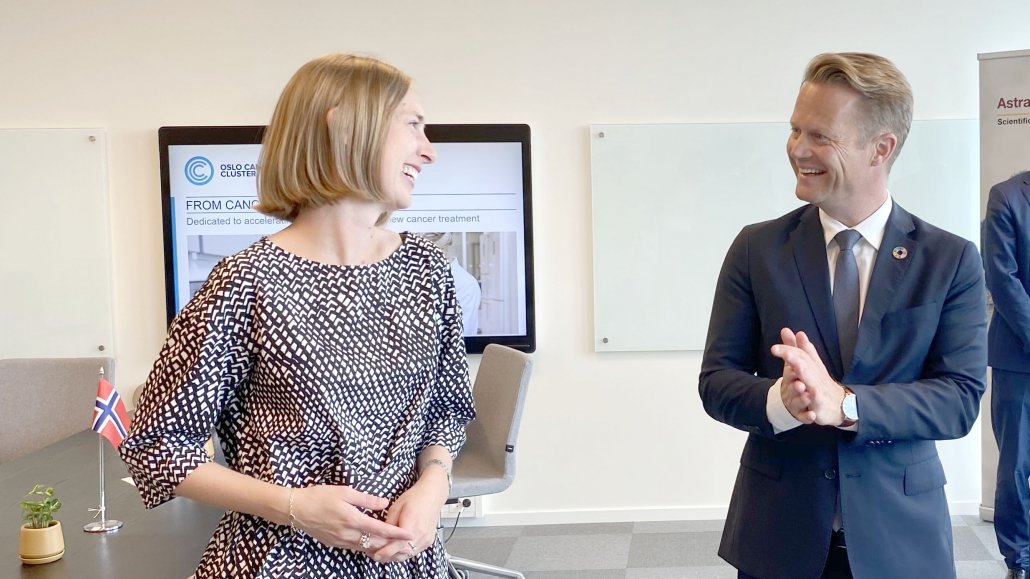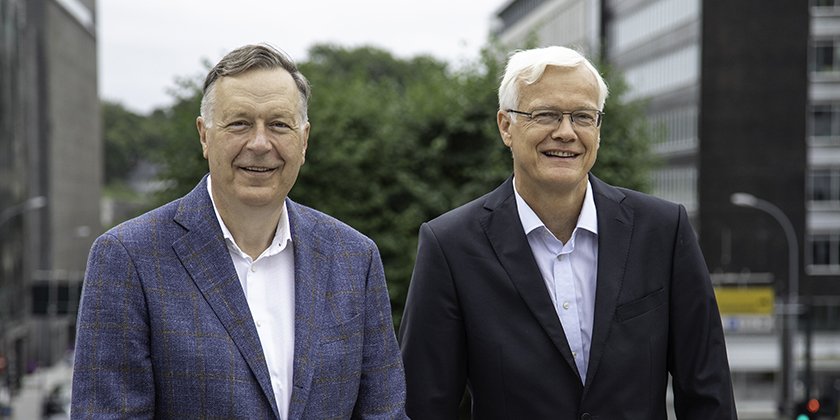
Molecular diagnostics, clinical studies and exercise plans for cancer patients were three key topics raised in last week’s event.
We teamed up with Aktiv mot Kreft, Merck Norway and GSK Norway to put a spotlight on innovative cancer treatments in Norway.
Due to corona restrictions, we transformed this event (originally planned for Arendalsuka) into a digital bootcamp with short training intervals between each panel. This was livestreamed from Pusterommet at Akershus University Hospital on Wednesday 12 August 2020 at 5:00 pm.
The meeting consisted of three parts with different perspectives: diagnostics, treatments and exercise plans.
View the entire meeting via Facebook here or watch it via our YouTube channel below:
Warming-up to genetic testing
The warm-up session involved a discussion on how improved diagnostics can help doctors determine the best treatment for each individual patient.
Dr. Andreas Stensvold, Head of the Cancer Department at Sykehuset Østfold, talked about how he has used off-label treatments to help some of his patients.
One example is Kjetil Nerland who had already received the traditional treatment methods: surgery, radiotherapy and chemotherapy, but found they did not work for him over longer periods of time.
After going through genetic testing and detailed analysis of the tumour cells, Stensvold could offer Nerland an off-label treatment. The medicines had already been approved for a different cancer type.
“It’s not fun to have cancer, but it is fun to live longer and to not have to go through chemotherapy again,” Nerland said.
Jan Frich, vice administrative director for the South-Eastern Regional Health Authority, explained they are setting up the infrastructure for advanced molecular diagnostics.
“We need to build up the diagnostics – that is the basis for personalized medicine,” Frich said.
Professor Jan Helge Solbakk from The Centre for Medical Ethics at the University of Oslo was however critical of how little is being done to approve new cancer treatments and implement personalized medicine in Norway.
“Norwegian authorities are a little bit too scared of personalized medicine. When there is a big breakthrough or when we see great effect in one patient, they worry about the cost,” Solbakk said.
High-intensive discussions on clinical studies
The next panel discussed: How can Norway keep up with other countries on implementing precision medicine?
Professor Kjetil Taskén, Director of the Institute for Cancer Research at Oslo University Hospital, highlighted three things: building infrastructure for molecular cancer diagnostics, attracting more clinical studies that utilise molecular diagnostics and implementing this in regular clinical practice.
The initiative IMPRESS Norway works towards a public-private collaboration, with public financing to do a large clinical study in collaboration with several private companies. They will follow a set of guidelines to find out which cancer treatment is best for which patient.
“I think the dialogue between governmental institutions and private companies has been good so far. We are aiming to get a shift towards more public-private collaborations,” Taskén said.
The clinical study IMPRESS Norway is modelled on studies done in the USA and Netherlands. Results from the ongoing Dutch study show that if enough patients and companies are involved, it is possible to find one extra treatment option for 50% of the patients by using molecular diagnostics.
The pharmaceutical industry agrees that this is an important step towards precision medicine.
“It should be a political goal that clinical studies become part of ordinary cancer patient treatment, so that all patients who have been through treatment are offered a place in a clinical study,” Steinar Thoresen, Head of Oncology and Strategy, Merck Nordics and Netherlands, said.
Frøydis Høyem, State Secretary at the Ministry for Health and Care Services, was positive about more public-private collaboration on cancer care.
“The Norwegian government genuinely cares about cancer patients and wants to land a public-private collaboration. We need to come together, discuss this more and agree on how to take it further,” Høyem said.
Relaxing perspectives on exercise
How do we prepare the patient to be in the best possible shape to handle a cancer treatment? This was the key question in the last panel of the meeting.
A new initiative at Akershus University Hospital has put educating patients about coping with cancer, along with exercise and diet plans, at the forefront for all their treatments.
The results?
“We have higher patient satisfaction. They experience a higher degree of involvement, shorter waiting times and less complications,” Dr. Geir Arne Larsen, Head of Department for General and Digestive Surgery at Akershus University Hospital, said.
“It is neither high tech medicine nor resource demanding. In total, we use less resources on these patients, so the hospital’s capacity for intensive care, surgery and hospital beds can be used for other patients,” Larsen continued.
Hanne Garde is one of the patients who has been involved. She is happy she could take part in an individualised plan for diet, exercise and managing the disease, which made all the difference for her during treatment and recovery.
“It was perfect for me personally to be able to take an active role in my own treatment,” Garde said.
Yngvar Andersen, Ambassador for Aktiv mot kreft and training enthusiast, led all the exercise intervals and finished the meeting with some exercises for all the participants.
“I have seen how meaningful exercise is for many cancer patients. Life might not become longer, but it becomes a little bit better,” Andersen said.
Meeting participants:
- Siri Lill Mannes, host
- Frøydis Høyem, State Secretary in the Ministry of Health and Care Services
- Jan Frich, vice administrative director at the Norwegian South-Eastern Regional Health Authority
- Andreas Stensvold, oncologist and Head of the Cancer Department at Sykehuset Østfold
- Jan Helge Solbakk, professor at the Centre for Medical Ethics at the University of Oslo
- Kjetil Taskén, Director of the Insitute for Cancer Research at Oslo University Hospital
- Steinar Thoresen, Head of Oncology and Strategy, Merck Nordics and Netherlands
- Geir Arne Larsen, Head of Department for General and Digestive Surgery at Akershus University Hospital
- Yngvar Andersen, Ambassador for Aktiv mot kreft and training enthusiast
Thank you to all participants and organising partners for making this meeting possible!










